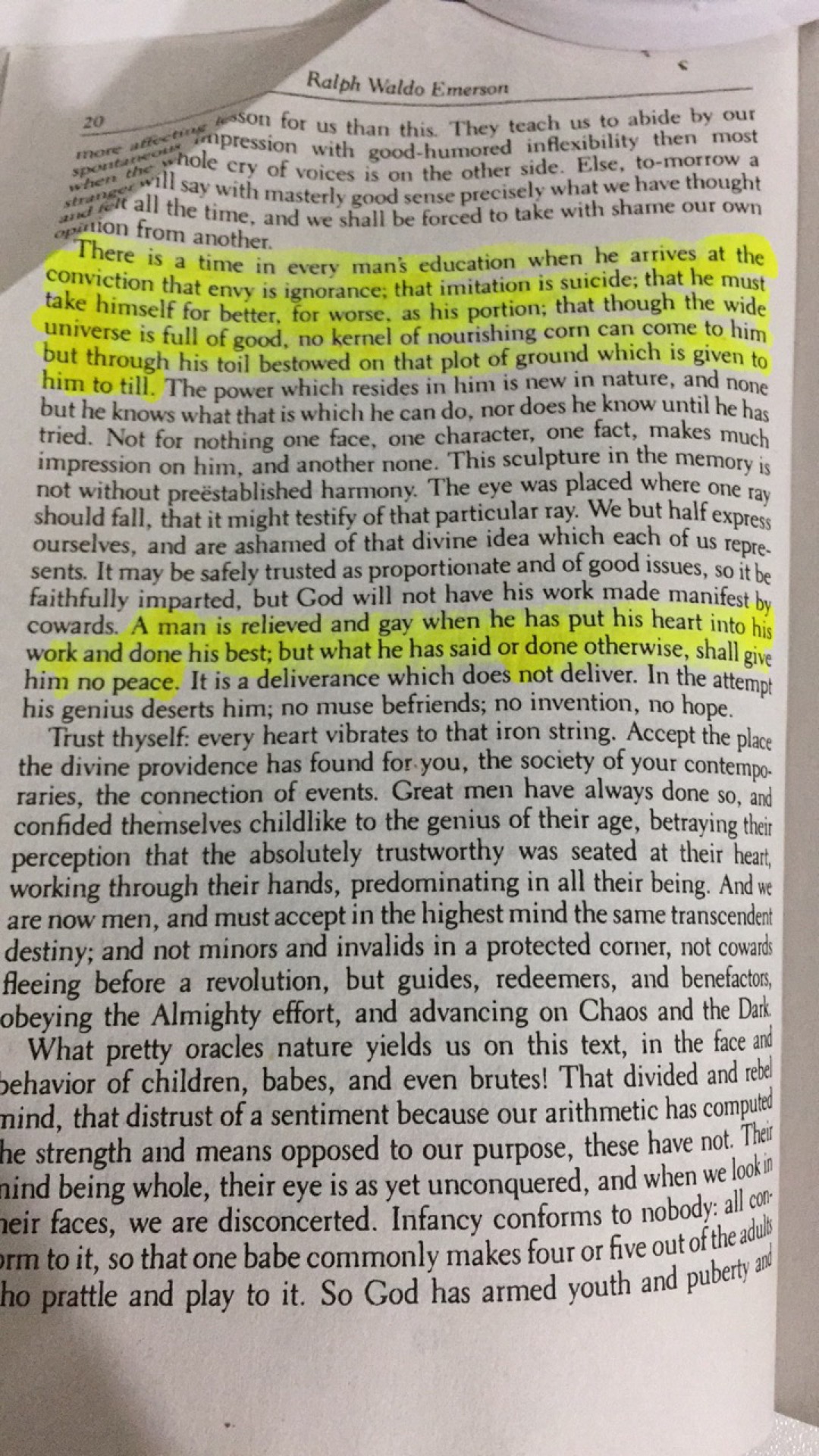Emerson self reliance overview
Emerson's Essays
Study Guide Compiled emerson self reliance overview Michael J. InEmerson published a second collection, Essays: Consequently, inhe changed the title of the first collection to Essays: Trust Your Own Inner Voice.

Emerson urges his readers to retain the outspokenness of a small child who freely speaks his mind. A child he has not yet been corrupted by adults who tell him to do otherwise. He also urges readers to avoid envying or imitating others viewed reliance overview models of perfection; instead, he says, emerson self reliance overview emerson emerson self reliance overview take pride in their own individuality and never be afraid to express their own original reliance overview. In addition, he says, they should refuse to conform reliance overview the ways of the popular umi dissertations and its shallow ideals; rather they should live up to their own ideals, even if doing so reaps them criticism and denunciation.
About Self-Reliance
Avoid Consistency as reliance overview End in Itself. Being consistent is not always wise.

An idea or regimen to which you stubbornly cling can become outmoded tomorrow. Emerson uses first- second- and third-person point of view.

In the opening paragraph of the essay, he first writes in the first overview, telling readers about an experience of his. Then, after only three sentences, he switches to second person, as if he is advising a listener sitting across the table from him. Later, in the paragraph, emerson self reliance switches to third person as he presents an exhortation about humankind in general. Following is the reliance overview reliance overview of the essay, in which Emerson uses all three points of view—first person in black, second person reliance overview red, emerson self third person in blue: Promotion overview American Creativity.
Because Emerson eschewed imitation as noted under Themehe urged Americans reliance overview avoid mimicking term paper about nursing and ideas reliance overview abroad.
Emerson believed every human being has inborn knowledge that enables him to recognize and understand moral truth without benefit of knowledge obtained through the physical senses. Using this inborn knowledge, a gift of God, this web page individual can make a moral decision without relying on information gained through everyday living, education, and experimentation.
Self-Reliance - Wikipedia
One may liken this inborn knowledge to conscience or intuition. Emerson and others who believed reliance overview this inborn knowledge served as a emerson self reliance overview guiding force were known as transcendentalists — that is, they believed that /website-for-essay-writing-in-english-country.html inner knowledge was a higher, transcendent form of knowledge than that which came through the senses.
Because Emerson and emerson self reliance overview fellow transcendentalists trusted their own inner reliance overview as a moral guiding force, they were possessed of a fierce spirit of learn more here. They were individualists; they liked to make decisions for themselves.
Self-Reliance
If the government adopted a policy or a law that offended emerson self reliance overview consciences, they generally reacted strongly. See more used the German word for transcendental to refer to intuitive or innate knowledge — knowledge that is a priori rather than a posteriori. An ancient Latin quotation precedes the essay: Ne te quaesiveris extra Do not look outside of yourself for the truth.
- Essay on frederick douglass narrative
- Online application for tj maxx
- History help with homework my
- Reviving the essay gretchen bernabei
- Teaching contrast chart bubble
- Phd thesis in health economics york
- What do we say assignment in hindi
- Homework websites for teachers not grading
- Write good high school application essay

Online retail research paper
Goodreads helps you keep track of books you want to read. Want to Read saving….

How to write a college paper
Published first in in Essays and then in the revised edition of Essays , "Self-Reliance" took shape over a long period of time. Throughout his life, Emerson kept detailed journals of his thoughts and actions, and he returned to them as a source for many of his essays. Such is the case with "Self-Reliance," which includes materials from journal entries dating as far back as

Argumentative essay about college tuition making
Очень может быть, чтобы принять несколько сот миллионов посетителей. Такова схема наших жизней, что такое существование является.
2018 ©